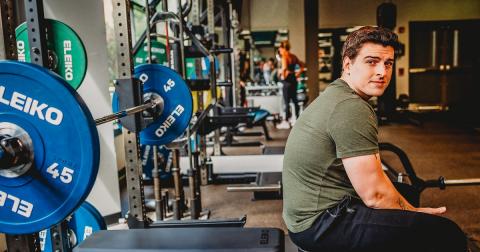
Eamonn O’Connell ’23G is a member of Plymouth State University’s inaugural master of science in applied exercise physiology and human performance program. He already had a connection with Professor Vincenzo Nocera, as both attended the same undergraduate school in New Jersey.
“I joined the first cohort as a happy accident but coming here has been one of the best experiences of my life,” O’Connell says.
O’Connell has taken advantage of many PSU opportunities, including teaching an undergraduate course, making an oral presentation at the New England Chapter of the American College of Sports Medicine Conference, and fulfilling his graduate assistantship in the University’s new Morgridge Strength and Conditioning Lab, which boasts top-notch equipment for athletes of all levels.
“The best part of PSU, though, is the faculty,” says O’Connell. “These are some of the best teachers around. My professors and the school itself have backed my endeavors to the extent of providing highly specific equipment for my study. You’d be hard-pressed to get that kind of research support somewhere else.”
In Fall 2022, O’Connell completed a publishable study for his Research Methods in Exercise Science course. His research leads to one overarching question: How can we increase youth resistance training across the United States and around the world? As a recreational power lifter, he’s always been interested in fitness, but it wasn’t until he worked with young clients as a strength coach and personal trainer that his passion for youth participation emerged.
Professor Nocera shares that only about 21 percent of US youths get enough physical activity during the week. This is a troubling statistic, especially when paired with the feedback that O’Connell observes from many client families who express concern that resistance training is dangerous for children despite studies showing its benefits. O’Connell aims to address these myths through his research.
“He’s promoting the idea that resistance training is safe to do when done correctly,” Nocera says. “O’Connell has the certifications and the tools to safely prescribe exercise for this specific group.”
With this larger goal in mind, O’Connell has focused his master’s thesis on the pediatric inactivity triad, a framework based on pediatric loss of strength with absence of disease, physical inactivity or physical illiteracy, and lack of confidence or competence to perform physical activity. O’Connell and Nocera will be testing the current theory, which maintains that if one factor is present then all three are. The hope is that their findings will inform school systems so exercise intervention plans can be applied and accepted schoolwide.
O’Connell will begin researching and creating interventions for schools in the Plymouth area before eventually expanding to schools across the United States, and he is looking for local children ages 8–12 to participate in his spring study. They will be taken through a series of fun tests on the PSU campus, similar to fitness testing in a school setting. For more information, e-mail him at Eamonn.OConnell@plymouth.edu.
O’Connell plans to continue his research while pursuing increased youth resistance training through a doctoral program next fall. His dream of a healthier, more physically active child population is only beginning.

